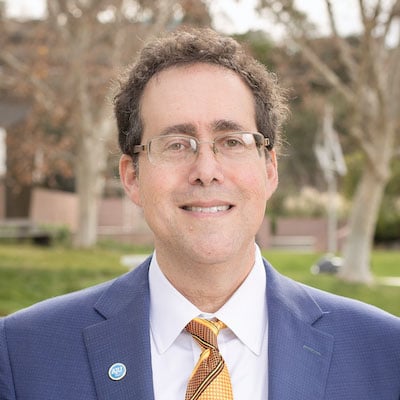
The coronavirus is now officially a worldwide pandemic, with hundreds of thousands of confirmed cases, thousands of deaths and also tens of thousands of people who have recovered after testing positive for COVID-19. More than half of the 195 countries in the world have been infected.
Some people are responding with a level of panic rarely encountered, while others brush off this pandemic as if it is already under control. Both responses fail because they see our duty as isolated and individual, as if it’s all about keeping me safe and distracted, regardless of the human cost or global impact. This isolated individual is a biological lie and a cultural dead end. We are ourselves only in relationship to one another and to all creation.
We are taught (Exodus 19:2 and Rashi) that the reason the Torah was given at the foot of Mount Sinai is that at that particular moment, in that particular spot, the Children of Israel came together as one. Transcending their fragmentation and disputes, they circled that mountain united in hope and possibility. It was precisely because we were, for that instant, one united camp, that the One God would be heard.
This moment also calls us to form a united camp, not only the Jewish people, but all humanity coming together in the only kind of cosmopolitan universalism that counts: an affirmation of life, of caring and of hope.
Bein Adam Le-Havero: Our Responsibility to Sustain One Another
Finding the Derekh ha-Beinoni, the Middle Path, to steer us between the crashing waves of hysteria and panic on the one hand and the battering rocks of denial and avoidance on the other will require determination and resolve. “We will hear and we will do” (Exodus 24:3) must become the mantra of this season. While it may be tempting to do nothing and to pretend that nothing has changed, we must mobilize the courage to first listen to the health experts and to then transform their guidance into government policy and personal practice.
Each of us must find the inner strength to be Nachshon, the brave Israelite willing to plunge into the sea so it could part and allow the Children of Israel to pass to freedom. By daring to change our ways, we can take on a life of service for the sake of human health.
In that spirit, we must curtail our exposure to large crowds and to the possibility of infection. The coronavirus is the new reality, and it won’t go away. But limiting the range of its contagion and slowing its spread will literally create the difference between life and death for many of our vulnerable beloveds (older people, immunologically compromised people, and others). Jewish tradition teaches that love (chesed) is not merely an inner emotion, it is a way of behaving to others that makes the love manifest. We owe these dear ones our compassionate acts of self-restraint and responsibility: repeated hand-washing with soap, avoiding touching our faces, greeting others with a wave or smile instead of handshaking or hugging, heightened levels of sanitation at work and in public places, alternatives to public assemblies and staying home when sick or exposed. Our choices can literally redeem the world.
It is not enough to change behavior and to enact policies to care for one another if we don’t also find better ways to care for ourselves. Humans begin to shrivel without contact with others. In excessive isolation we risk pandemics of the soul.
Bein Adam Le-Atzmo: Responsibility to Self-Care
It is not enough to change behavior and to enact policies to care for one another if we don’t also find better ways to care for ourselves. Humans begin to shrivel without contact with others and without access to the joys of life. In excessive isolation we risk pandemics of the soul.
We must find ways to reach out to one another, to give and receive love and care so that we are nourished for the task ahead. The biblical image of receiving manna each and every day, and of having to move our bodies to harvest this physical manifestation of love can inspire us through this wilderness, as well. Let’s use this time to strengthen whatever daily practice inspires and sustains us: daily prayer, psalms, meditation, exercise, a stroll, good fiction, poetry. Making time for inner renewal and physical vitality will be crucial in the stressful days and weeks to come.
That self-care itself has to keep the limits of our increased isolation malleable and flexible. Connecting to those we love through calls, texts, shared meals (Shabbat, anyone?) and streamed movies with family and friends will keep us alive. These occasions of relating strengthen us for the tasks we face and remind us that this, too, is life. Judaism’s most beloved prayer, the Shehecheyanu, locates God as the one who enlivens us, sustains us and brings us to this moment. Life is precious and invites celebration.
Judaism creates a calendar filled with opportunities for mindful joy, communal gathering and celebration. Being more attentive doesn’t require that we stop relating to one another and connecting. We just need to be more creative in making sure that we get what we need.
This pandemic will pass, creating a new normal in its wake. How we respond, supporting the scientists and their research to develop a vaccine, how we modify our behavior to limit the spread of the virus and to dampen its consequences, and how we find ways to feed our souls and to care for one another, these are the challenges and possibilities of this moment.
We do not venture into this fray alone. We walk with one another, carrying a Torah of wisdom and bearing the Divine image that allowed our ancestors to proceed forward to Promise. That Promise beckons us, as well. Let’s journey together!
Rabbi Bradley Shavit Artson holds the Abner and Roslyn Goldstine Dean’s Chair, Ziegler School of Rabbinic Studies, and is Vice President of American Jewish University


































 More news and opinions than at a Shabbat dinner, right in your inbox.
More news and opinions than at a Shabbat dinner, right in your inbox.